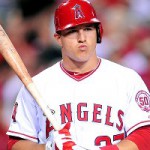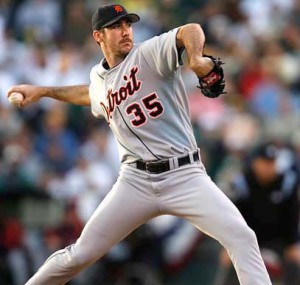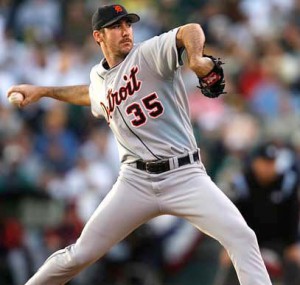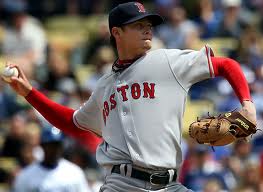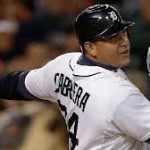
Cabrera wins the AL MVP as expected; can the blogosphere now declare peace? Photo AP via sportingnews.com
Here’s a wrap up of the end of season awards. I posted my predictions here in Mid October. The dream of going 8-for-8 is over. Read on for a summary of my predicions versus actual results.
- AL MVP: Prediction: Miguel Cabrera. Winner: Cabrera. Trout 2nd, Beltre a distant 3rd.
- AL Cy Young: Prediction: David Price. Winner: Price.
- AL Rookie of the Year: Prediction: Mike Trout. Winner: Trout, Unanimously.
- AL Manager of the Year: Prediction: Buck Showalter. Winner: Bob Melvin.
- Sporting News AL GM: Prediction: Billy Beane. Winner: Beane.
- Sporting News AL Comeback player of the Year: Prediction: Adam Dunn. Winner: Dunn. Note that there are now also MLB and Players Choice versions of this award, and they do not always agree with Sporting News’ picks. But SN is the oldest version so I’ll continue to guess based on it.
- NL MVP: Prediction: Buster Posey. Winner: Posey. Braun 2nd, McCutchen 3rd.
- NL Cy Young: Prediction: R.A. Dickey. Winner: Dickey.
- NL Rookie of the Year: Prediction: Bryce Harper. Winner: Harper.
- NL Manager of the Year: Prediction: Davey Johnson. Winner: Johnson.
- Sporting News NL GM: Prediction: Mike Rizzo. Winner: Rizzo, who technically came in 2nd to Beane as Sporting News only awarded one Executive of the year award.
- Sporting News NL Comeback player of the year: Prediction: Buster Posey. Winner: Posey.
My Final Prediction results: 7 of 8 of BBWAA awards predicted correctly, 11 of 12 including Sporting News awards.
Discussion (here’s a link to all the 2012 post-season BBWAA voting with totals from Baseball-Reference.com, plus i’ve included links to the voting and ballots where I could below).
- AL MVP: Cabrera wins over Trout; let the internet wars begin! The only thing that surprised me here was the relative landslide victory Cabrera had; he got 22 of the 28 first place votes, far more than I thought he’d get. This result shows what a lot of holier-than-thou bloggers need to wake up and understand; the MVP is NOT the award for the best player. Clearly these people (often rather rudely) do not understand the difference between stats-based analysis and context. Trout played for a 3rd place team; had he never played for the Angels this season … they still would have finished third. Like it or not, voters start their MVP lists by grabbing the best player on the playoff teams, and adjust accordingly. The solution to these arguments may be to create a hitting version of the Cy Young so that Trout can get his deserved due for his fantastic 2012 season.
- AL Cy Young: Price wins in a very close race over Justin Verlander, who had almost identical (and slightly better) sabremetric numbers to his dominant Cy Young last year and was the odds-on favorite of the Sabr-nerd crowd to win. I predicted Dickey not because he was inarguably the better pitcher; I predicted he’d win because voters sometimes like to give these awards to the fresh new candidate, and I saw that happening here. Price and Verlander split the first and second place votes almost down the middle, except for one random first place vote that went to Fernando Rodney. The Rodney vote, combined with both Los Angeles voters giving 2nd place votes to Jered Weaver, is the margin of loss for Verlander. Still, this was the closest Cy Young voting race in the history of the award.
- AL Rookie of the Y ear: No doubt here; Trout becomes just the 8th unanimous RoY pick in baseball’s history, and deservedly so. Yoenis Cespedes second, Yu Darvish third.
- AL Manager: My first miss on BBWAA awards in three years. The criticism of this award is that it is less about who actually manages their team the best; it really is given to the team that “surprised” baseball pundits the most. In retrospect, for all the reasons I predicted Billy Beane would get the executive award I should have given more thought to Melvin winning the Manager award. Showalter’s Orioles certainly surprised, and you can squint and say that their record in one-run games is entirely on the manager. But there’s no mistaking that the Athletics out-played their potential far more distinctly than the Orioles did.
- AL Executive: No surprise that Beane picks up this award, after flipping 3/5s of his rotation, signing the cuban defector Cespedes and getting Josh Reddick in trade, putting together a team that I thought could lose 110 games but instead won the AL West over two of the most bally-hoo’d teams in the majors. For all the people that chastised Beane for Moneyball, he has risen again after his early career success.
- AL Comeback player: I really struggled to pick a winner, thinking that Dunn’s pseudo-rebound from 2011’s disaster was a good enough example, and I got lucky. SN picked Dunn while other AL comeback awards out there went to Fernando Rodney.
- NL MVP: Posey takes this race in a landslide, getting 27 of the 32 first place votes. I’m really glad to see Braun get 2nd place despite the stigma surrounding his negated PED test last off-season; he won my “Modern Triple Crown” and was the best hitter in the league. Chase Headley gets deserved recognition and a 5th place vote. Several Nats got votes as expected, but none were factors in the race itself.
- NL Cy Young: this race wasn’t as close as I thought it may be, but Dickey beats out Clayton Kershaw for many of the same reasons Price beat out Verlander. Our own Gio Gonzalez comes in a close third; as it turns out, one reporter in St Louis completely left him off his ballot, purportedly because Gonzalez didn’t broach 200 innings. Which makes no sense, since this same reporter gave his 5th place vote to a reliever. *sigh* I hate hypocrites
- NL Rookie of the Year: Harper won a very close race over Wade Miley and for good reason; on September 1st you would have said that Miley was the easy RoY candidate. A strong finish combined with Harper’s narrative and probably some east-coast bias gave him the award. One writer completely left Miley off his ballot, but that wouldn’t have made a difference in the voting totals in the end. Another side note: have you ever even heard of the two Washington BBWAA chapter members?
- NL Manager: Johnson picks up the “manager of the most surprising team” award relatively easily; there really weren’t any other contenders once Pittsburgh collapsed mid-season.
- NL Executive: Rizzo’s Gio Gonzalez trade, Jackson signing and Harper call-up all led to a 17-game improvement and the major’s best record, earning him 2nd place in the overall executive award voting (to Beane) and thus the highest ranking NL executive.
- NL Comeback player: Posey was really a no-brainer, and won the award as expected.
I’ll say this in conclusion; the Trout-Cabrera arguments were the most one-sided, rude and biased I’ve seen yet in the whole “new school” trend of baseball writing. Even more ridiculous than the Jack Morris antagonists. And I’m thankful that, after today, I won’t have to read one more “Why Trout is the MVP” article.
